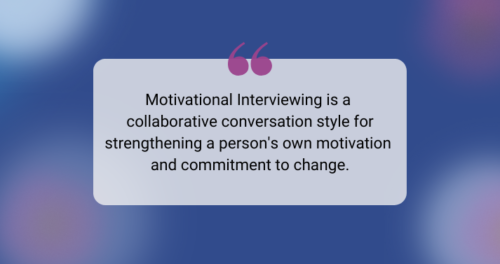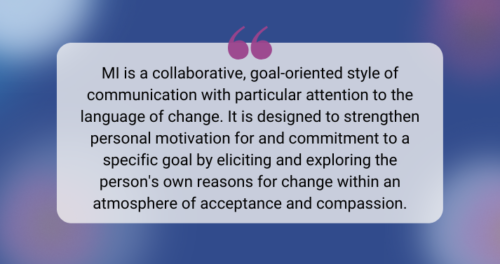Can I Use Motivational Interviewing All of the Time?

I periodically get the question, “Do you use Motivational Interviewing all of the time?”
Yes… and no.
Let’s break it down.
The simplest definition of MI, as cited in the Miller & Rollnick Motivational Interviewing book:

Then here is a more thorough definition from the same book:

Whew! That one second definition is a mouthful! It says a lot of important things.
So what does Motivational Interviewing look like operationally?
It means “being” with clients in the foundational spirit of Motivational Interviewing, while using OARS skills to ‘row’ toward a specific desired change.
So, can you use Motivational Interviewing all of the time?
Yes, and no.
Yes: We can ALWAYS strive for the spirit of MI. Compassion. Unconditional positive regard. Acceptance. Partnership. Evocation. Curiosity. We can always work to express the spirit of MI with clients. It’s a mindset. It’s a heartset. It’s a daily practice.
Yes: The OARS skills can be used in just about every single human interaction. Simply put, they are great communication skills. OARS is an acronym for Open-ended questions, Affirmations, Reflections, and Summaries.
Open Ended questions invite others to share more. Affirmations help others recognize their inherent strengths, skills, efforts, intentions, abilities. Reflections help others feel deeply listened to, and can guide conversation in new directions. Summaries help others feel we are listening, track conversation, focus topics and guide conversation.
Here’s where the “No” comes in.
Motivational Interviewing is a guiding style of communication. We use MI when there is a specific change goal in mind. We use MI to guide the conversation in a particular direction to help someone resolve ambivalence and begin moving toward change.
We aren’t always guiding conversation when we are talking with someone!
Think about it. Miller & Rollnick talk about three conversation styles: Directing, Guiding, and Following. There are times when the following style of communication is called for. Times where directing is appropriate.
Motivational Interviewing is useful when someone is ambivalent about change, and it’s something that would be good for them to do.
Motivational Interviewing is NOT about getting someone to do what you want them to do.
Motivational Interviewing is a guiding style of communication used to help someone resolve ambivalence about something that is in their best interest to change. It’s important to explore collaboratively with your clients about what change they are seeking, why that change is important to them, and how they might get there.
Motivational Interviewing Tip of The Week: Consider what element of MI you are engaging with. Is it the Spirit of MI: Compassion, acceptance, partnership, evocation? Are you utilizing the OARS skills? Are you honed in on a specific change goal with someone and eliciting their motivation for change around it? You are using MI if it is all of the above!
Related Posts

Motivational Interviewing Miller & Rollnick! Here’s what’s new!
The name “Motivational Interviewing” seems like a less-than-fitting name for what it actually is. For years, even as a trainer, I struggled with the name Motivational Interviewing.“Motivational” makes me think of motivational speakers, cheerleading, and motivating...
Related Posts

Motivational Interviewing Training Online FREE, Plus 3 Tips Moving from Wrestling to Dancing with Your Clients
Join our newsletter to never miss our Motivational Interviewing Training Online Free!I have more free motivational interviewing online resources for ya! Today, I’m sharing a free motivational interviewing download called Moving from Wrestling to Dancing.When we are...

Let’s Learn Together!
Hi, I’m Hillary Bolter. At MI Center for Change, Motivational Interviewing is our passion. Motivational Interviewing will help you become more effective and efficient as you support clients’ change!

